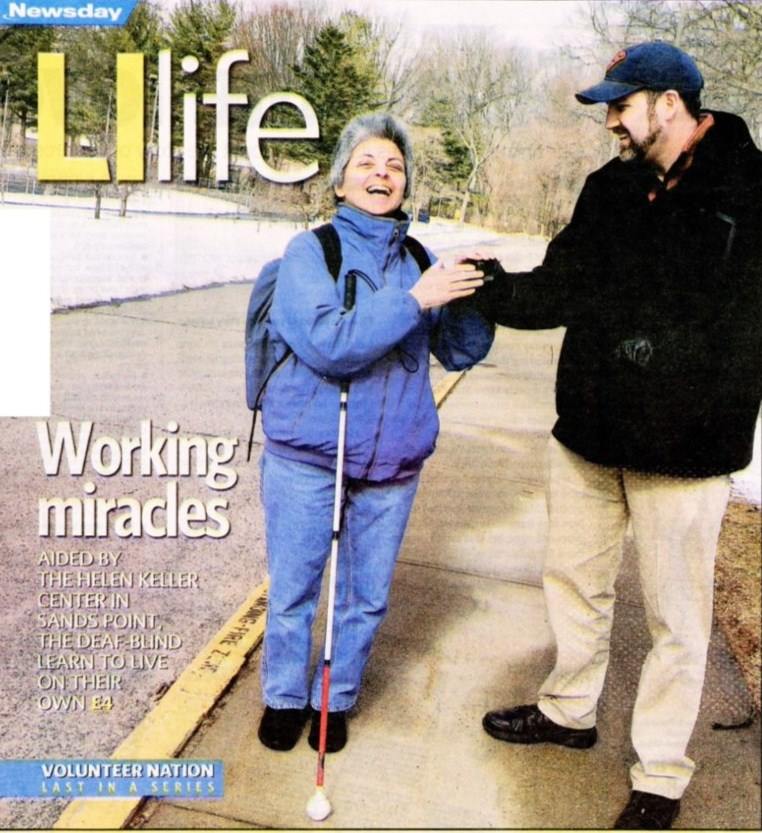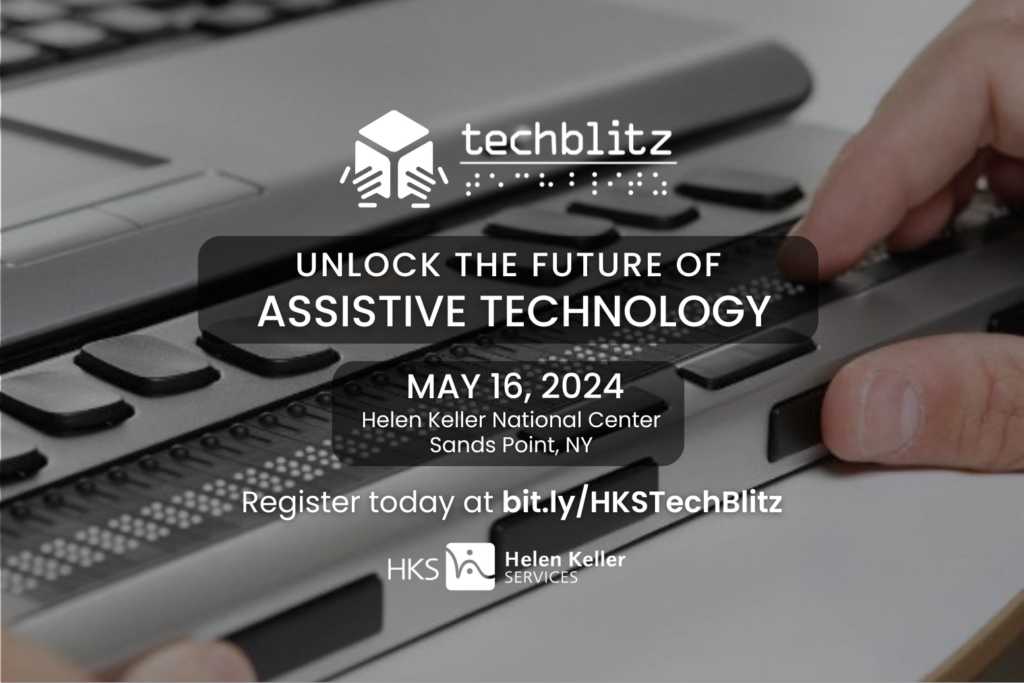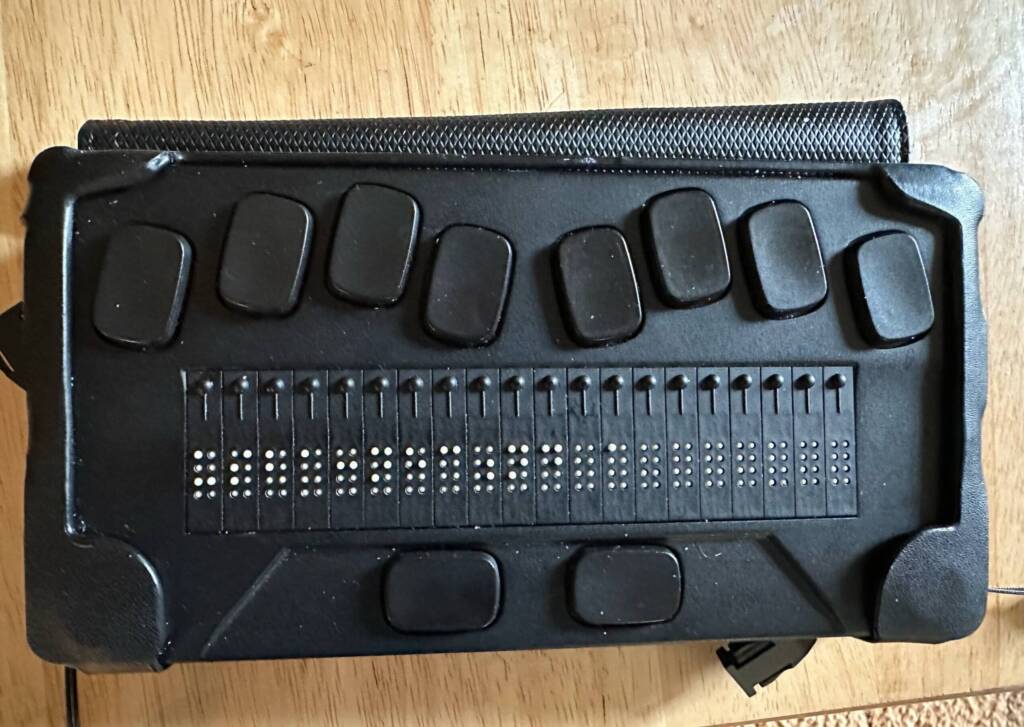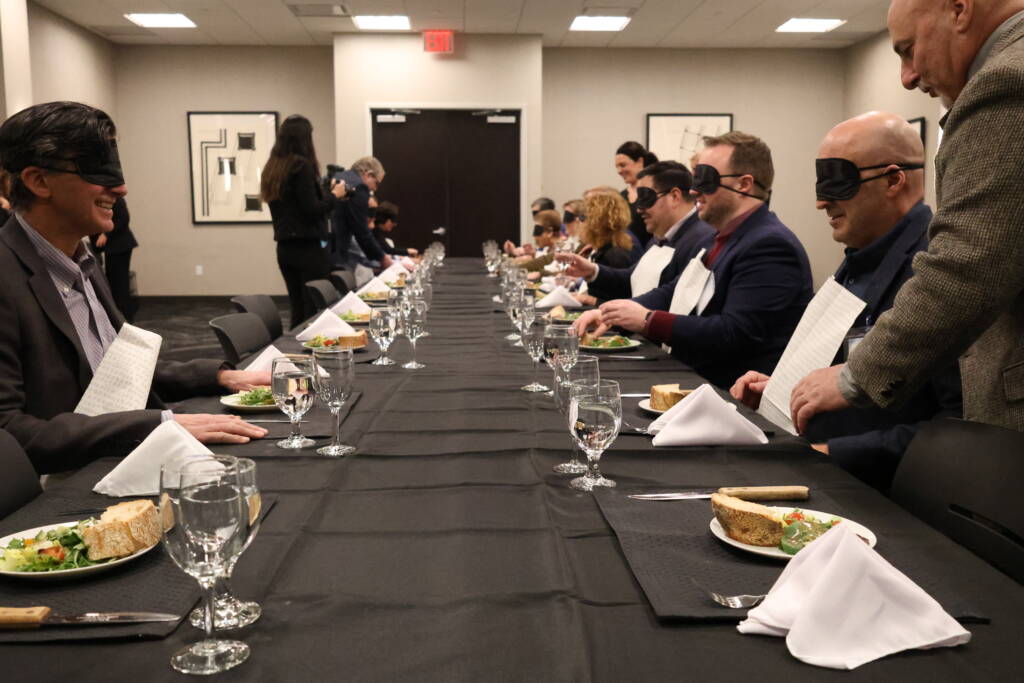Newsday: Working Miracles
Newsday ran a feature article celebrating the 50th Anniversary of HKNC and more importantly, the work being done at the National Center.

On the cover participant Mary Smith of Shepherdstown, West Virginia, greets instructor Don Horvath at the Helen Keller Center in Sands Point.
By Merle English, Newsday | February 25, 2017
Original article on Newsday’s website
Working Miracles
Aided by the Helen Keller Center in Sands Point, the DeafBlind learn to live on their own.
“I am only one, but still I am one. I cannot do everything, but still I can do something; and because I cannot do everything, I will not refuse to do the something that I can do.” Edward Everett Hale
Independence Days
DeafBlind youths and adults learn life-changing skills at the Helen Keller National Center, celebrating 50 years. Volunteer Nation – Last in a Series.
For nearly half a century, men, women and children from around the country who are deaf and blind have come to Long Island to the only agency in the United States that equips them to live independently.
The Helen Keller National Center for DeafBlind Youths and Adults (HKNC) in Sands Point is marking its 50th anniversary with year-long celebrations that emphasize its mission: to ensure that all people who are deaf and blind receive the specialized training they need to live, work and thrive in the community of their choice.
“Helen Keller helps people become successful,” said Maricar Marquez. She speaks from years of experience, which includes an internship at the center.
Marquez, 45, was born in the Philippines with Usher Syndrome, an inherited condition that causes hearing loss and progressive vision loss. It is the leading cause of deaf-blindness, according to the National Eye Institute, which is part of the National Institutes of Health.
She is the coordinator of the Independent Living division at the center, teaching participants — whom the Helen Keller National Center refers to as “consumers” — how to safely cook and clean for themselves. Marquez, of Queens Village, has a master’s degree in administration from Gallaudet University, a school for the deaf in Washington, D.C.
“I’m here 20 years, working in different programs,” Marquez said. “I love to be able to empower others
to be like me.”
Marquez describes her sight as “fuzzy. There are no details.” But it hasn’t kept her from running marathons and triathlons, going on hot air balloon rides, parasailing or rock climbing.
She is among a staff of 130 trained professionals — some of whom were former participants at the center — who help participants learn life-changing skills. Lessons include learning how to communicate using American Sign Language and touch; how to travel safely using a cane, a taxi or public transportation; how to succeed in the workplace; and how to manage their homes. The instruction is largely one-on-one.
The path to practical, real-world guidance and services was laid in 1967 when President Lyndon B. Johnson signed into law amendments to the Vocational Rehabilitation Act, calling for a national rehabilitation center for people who are DeafBlind.
The Helen Keller National Center has 11 regional offices nationwide. They are the first point of contact for people coming to the center, named after the famed American author, lecturer and political activist who became DeafBlind from a childhood illness and learned to communicate through a tutor.
The organization was housed in a converted warehouse in New Hyde Park before it moved to Sands Point in 1976. The facility on Middle Neck Road consists of three buildings on 25 acres near Sands Point Preserve and Falaise Museum in the historic Gold Coast area. One building is for training; another is a residence that can accommodate 50 people; and the third houses offices.
The current population of 30 participants ranges from high schoolers to senior citizens who may have age-related vision and hearing loss. Participants live on campus during their training, but if they live nearby they can commute to the center or receive services at home or at their work site.
Susan Ruzenski, the center’s executive director, said that in the past 10 years the center and its regional offices have provided services to more than 17,500 participants and 4,350 families, including spouses, parents and siblings who receive information and training to support their loved ones.
She said the center had up to 50 volunteers in the early years, but that the recent loss of the coordinator has resulted in fewer volunteers. Those who are interested in helping must be at least 18 years old and undergo a background check. Volunteers help participants exercise at the gym, act as sighted guides on outings in Sands Point and New York City attractions and participate in arts and crafts events. They are also offered complimentary classes in American Sign Language.
“The 50th anniversary is a time to reflect on where we’ve been and all we’ve accomplished,” said Ruzenski, 60, of Stony Brook. “It is also a time to make clear our focus is squarely on the future. We won’t be satisfied until all DeafBlind individuals in the United States — young and old — have access to opportunities to live full and empowered lives equal to their hearing and sighted neighbors.”
‘Need has never been greater’
The Helen Keller National Center for the DeafBlind is a division of Brooklyn-based Helen Keller Services, which was founded in 1893 as the Industrial Home for the Blind. As the parent organization of Helen Keller Services for the Blind and the Helen Keller National Center for the DeafBlind, it refers individuals to the appropriate division and is the first stop for receiving help.
Helen Keller Services for the Blind provides services for individuals from 2 months old and up who are legally blind and who may or may not have other disabilities. It serves only people in New York City, Nassau and Suffolk.
Joseph Bruno, president and CEO of Helen Keller Services, said that “a recent survey estimated that 2.4 million people in the United States have a combined vision and hearing loss. Clearly, the need has never been greater for the many services offered by HKNC.”
To receive those services, participants must be referred through their state vocational rehabilitation agencies. The states provide tuition, room and board. The U.S. Department of Education’s Rehabilitation Services Administration pays a portion of the operating budget. Participants stay as little as a week, and on average a year. Depending on their individual training program, some may remain for two years.
Participants are grateful for the opportunity to learn skills that enhance their quality of life. Faith Altheida, 59, said she came to the center from Indiana in July to learn how to read and type Braille.
“I would like to continue learning as much as I can, then look for a possible job in a clothing store doing stock work,” Altheida said using American Sign Language and aided by an interpreter. “I’ve been giving it my all here at Helen Keller. I’ve learned a lot from the instructors, and I enjoy it.”
The center also trains professionals at rehabilitation centers, group homes and other agencies that work with individuals who are deaf or blind.
Advances in technology “level the playing field” for DeafBlind people in their quest to live independently, said Kathy Mezack, coordinator of vocational services at the center in Sands Point and a resident of Rockville Centre. Under the Video Accessible Act, the Federal Communications Commission mandates that DeafBlind people receive telecommunications equipment, such as an iPhone that enables the user to connect to the internet using Braille. They can also navigate safely using a GPS on an iPhone along with a Braille Display, another device. They can know, for example, whether a taxi driver is going the wrong way.
Mezack’s department helps participants explore the kind of work they’d like to do and collaborates with Long Island companies that provide internships and entry level or advanced jobs. Some participants repair computers or do plumbing work, and others work as a physical therapist’s aide or as a research assistant for a lawyer.
Josh Brandt, 28, is a teacher’s assistant at a school for the deaf in Mill Neck. He has a bachelor’s degree in history from Gallaudet, but said he couldn’t find a job, “anything, because of my disability.”
“HKNC has given me hope for the future,” said Brandt, who has tunnel vision and is living at the center while he completes his training. He is studying for his certification so he can teach history. “They’re teaching me so many skills.”
Participant Donna Stone, 60, of Salem, Oregon, has been hard of hearing since she was 4, and came to the center in August to improve her Braille and independent living skills.
“It was a big dream of mine,” said Stone, who wants to be trained to be an advocate for the DeafBlind. “I’ve learned more about myself. It’s easier to mingle here. I get a lot of support from the staff.”
Picture caption: Elizabeth Aguilera practices sign language in her communications class with instructor Garwin Posner, one of 130 professionals at the center.
A Dedicated Staff
Like its participants, the staff at the Helen Keller National Center comes from near and far, with equally varied backgrounds.
Chris Woodfill, 55, is associate executive director and a senior adult specialist at the center. He is originally from Racine, Wisconsin and now lives in Port Washington. Woodfill, who was born deaf and has tunnel vision, has a master’s degree in Latin American studies from George Washington University in Washington, D.C., and a master’s in deaf education from McDaniel College, a private liberal arts school in Westminster, Maryland.
Ruzenski has been with the nonprofit for 38 years. A friend who had worked at the center told her she would probably enjoy working there and suggested she do an internship. She did “and I never left,” Ruzenski said.
She started at the center as supervisor of participants living on campus. Ruzenski’s other positions were supervisor of participants’ daily living skills; supervisor of communications learning; director of the center’s comprehensive training program; and interim executive officer. She became executive director in 2014.
She said she would like to reduce or eliminate some participants’ travel time. “We’d love to get funding to create more centers in other parts of the country so some people wouldn’t have to travel to New York to be trained,” Ruzenski said.
Some of the center’s supporters will travel to New York to help celebrate its 50th anniversary. Activities will be held throughout the year and include:
A “Sip N’ Paint” event March 15 at Il Bacco Ristorante in Little Neck;
A Community Open House April 23 as part of the center’s signature fundraising event: Helen’s Run/Walk 2017, a 5k in Sands Point;
A reception May 21 before a stage performance of “The Miracle Worker” — the story of young Helen Keller’s life — at The Queens Theatre in the Park;
The Helen Keller Services Annual Gala Sept. 14 at the Garden City Hotel that will feature honorees related to the center’s history and the unveiling of the center’s “Wall of Fame” paying tribute to pioneers and innovators who advocated for services to the DeafBblind.
Mezack said the center’s goal is to “work with participants so they reach the highest level of independence.” That mission will continue amid the celebrations and beyond. Residents from other countries can self-pay and utilize the center’s services. Professionals who want to create similar programs in their country have come from Mexico and as far as Denmark, Sweden, Russia, China and Japan.
“There’s been a shift in the DeafBlind community,” Woodfill said. “In the past five years, deaf people have gained more control over their lives. They have become more confident in themselves. They can do a lot more with their lives. They believe anything is possible. When [participants] come here they’re at the end of their rope. Now they say, ‘I can get a job, live in the community, just like other people.’ This center helps people wake up again.”
Volunteer Spotlight
The term “retired” should be used loosely as it relates to Maryann Weinfeld. After a 36-year career at Smithtown High School, the math teacher has left one classroom for two others.
Weinfeld — who taught her last class at the high school in 2012 — is an adjunct professor at Suffolk County Community College’s Brentwood campus, and, by special request, she tutors a DeafBlind participant who wants to be a history teacher.
Officials at the Helen Keller National Center in Sands Point reached out to Weinfeld, 61, of West Islip, to tutor Josh Brandt, 28, a participant at the center, in math. Brandt is preparing to take the Praxis, a teacher certification examination that involves tests in reading, writing and mathematics.
Brandt, whose hometown is Mattawan, Michigan, said he could not find work there. “Because of my disability it’s difficult for me to find employment,” he said through one of the center’s American Sign Language interpreters.
Brandt was born profoundly deaf, has tunnel vision and uses sign language to communicate. In 2014, he graduated with a bachelor’s degree in history from Gallaudet University, a federally chartered private institution for education of the deaf in Washington, D.C. He wants to teach American history in elementary and high schools for the deaf, and came to the center a little over a year ago to be trained to live independently. To reach his teaching goal, he wanted to “reinforce his math skills,” Weinfeld said.
Weinfeld began tutoring Brandt last October, in 90-minute sessions on Wednesday mornings at the Barnes & Noble bookstore in Manhasset. She is assisted by a sign language interpreter from the Helen Keller Center, and the text is enlarged on a computer screen.
After the first four sessions, Weinfeld stopped taking a fee and offered to tutor Brandt for free.
“I did not want the money anymore,” she said. “Just working with him is payment enough. I admired Josh for his determination and perseverance, because math is not a favorite subject for some people. He was very enthusiastic and focused, and he always asks for homework at the end of every session.”
Weinfeld said she thinks Brandt will be ready when he returns to Michigan to take the certifying exam in April. But until then:
“I look forward to every session,” she said. “It’s a refreshing way to start the day.” — Merle English
Sign Me Up
There are many opportunities for volunteers who would like to help the Helen Keller National Center carry out its mission of preparing DeafBlind individuals to live full lives.
Volunteers can participate in arts and crafts projects with participants; make music together; work out at the gym; act as sighted guides accompanying participants on outings in the Sands Point community, on trips to shopping centers, restaurants, the library, worship centers and New York City attractions; and they can join participants for parties in the residence lounge and engage in other recreational activities.
Volunteers are offered complimentary classes in American Sign Language and can build other skills working with people of diverse cultural and communication backgrounds.
Volunteers must be at least 18; undergo a background check and screening; and participate in a six-hour orientation session offered on the center’s campus to get an overview of its services and important aspects of working with people who are deaf and blind. An annual health checkup is also required.
For more information, send an email to Cwoodfill@helenkeller.org or to Lrocchio@helenkeller.org


